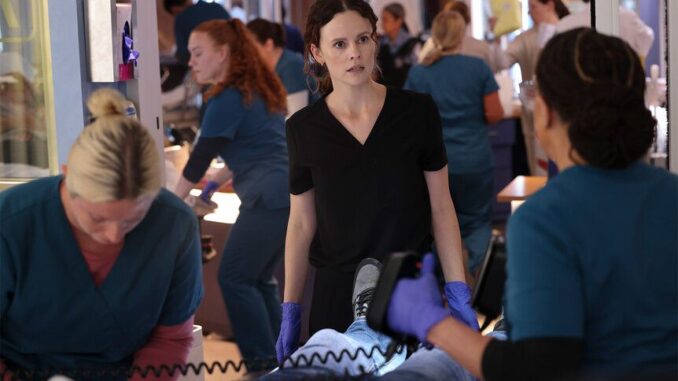
Chicago Med’s Emotional Recalls: Lenox’s Illness, Ripley’s Struggles, and the Ghosts of Romances Past
Chicago Med, with its relentless pace and life-or-death stakes, isn’t just about medical procedures and diagnostic puzzles. It’s a crucible where personal lives collide with professional demands, forging characters defined by resilience, sacrifice, and the enduring power of human connection. The show’s ability to weave compelling narratives around its medical cases is particularly evident in its exploration of characters facing immense emotional trials. This essay will delve into three such narratives: Lenox’s devastating illness, Ripley’s internal battles with addiction and self-doubt, and the resurfacing of old flames, each a potent illustration of Chicago Med’s talent for creating emotionally resonant storylines that captivate viewers.
Lenox’s illness served as a stark reminder of the fragility of life and the profound impact illness can have on a physician’s identity. Initially portrayed as a brilliant but somewhat detached attending, Lenox’s diagnosis with a rare and aggressive form of cancer shattered his meticulously constructed world. Suddenly, the healer became the patient, forced to confront his own mortality and vulnerability. The storyline wasn’t just about the medical intricacies of his disease; it was about the emotional toll it took on him, his colleagues, and his students. Watching Lenox, a man who dedicated his life to understanding and controlling the body, lose control of his own was deeply unsettling. We saw him grapple with anger, denial, and ultimately, a quiet acceptance. His interactions with other patients, particularly those facing similar struggles, became more empathetic, his cold demeanor softening as he found common ground in shared suffering. Lenox’s illness forced him to confront his own humanity, transforming him from a detached observer to a deeply feeling individual, leaving a lasting impact on the hospital and its staff. His experience resonated with viewers because it explored the universal fear of illness and the courage required to face the unknown.
Ripley’s struggles, on the other hand, presented a different kind of emotional turmoil, focusing on the internal demons that can plague even the most skilled professionals. His journey was a raw and unflinching portrayal of addiction, relapse, and the relentless fight for recovery. Ripley’s battles were not just confined to the physical aspects of withdrawal; they delved into the deeper issues of self-worth, guilt, and the constant fear of letting down those he cared about. The pressure of the medical profession, coupled with his own perfectionistic tendencies, created a breeding ground for his addiction. Watching him navigate the complexities of his personal demons while simultaneously performing life-saving surgeries was a compelling narrative, highlighting the vulnerability that can lie beneath a veneer of competence. His relationship with Hannah Asher, herself a recovering addict, added another layer of complexity, creating a dynamic marked by understanding, support, and the ever-present threat of relapse. Ripley’s story served as a reminder that addiction is a disease, not a moral failing, and that recovery is a continuous journey requiring unwavering support and self-compassion. It also offered a powerful message of hope, demonstrating that even those struggling with the darkest of demons can find redemption and rebuild their lives.
Finally, the return of old flames, a trope often employed in medical dramas, offered a different kind of emotional complexity, reminding us that the past can often resurface to complicate the present. These storylines often involved resurfacing feelings, unresolved conflicts, and the difficult choices that must be made when faced with a second chance. Whether it was a former spouse needing medical care or a long-lost love reappearing in the hospital, these returns forced characters to confront their past mistakes and reconsider their current relationships. The emotional weight of these encounters often had a profound impact, influencing their professional decisions and personal lives. These storylines explored the enduring power of love and regret, demonstrating how the past can shape our present and influence our future. They provided moments of intense drama, forcing characters to re-evaluate their priorities and confront the potential consequences of their choices. These romantic returns resonated with viewers because they tapped into the universal themes of love, loss, and the enduring hope for a second chance.
In conclusion, Lenox’s illness, Ripley’s struggles, and the return of old flames are just three examples of Chicago Med’s ability to create compelling and emotionally resonant storylines. By exploring the complexities of human nature, the show transcends the typical medical drama formula and delves into the heart of what it means to be human. These narratives are not just about medical cases; they are about the struggles, triumphs, and enduring power of the human spirit in the face of adversity, addiction, and the lingering echoes of the past. They are a testament to the show’s ability to connect with viewers on a deeply emotional level, reminding us that even in the midst of the most challenging circumstances, hope, healing, and human connection are always possible.
